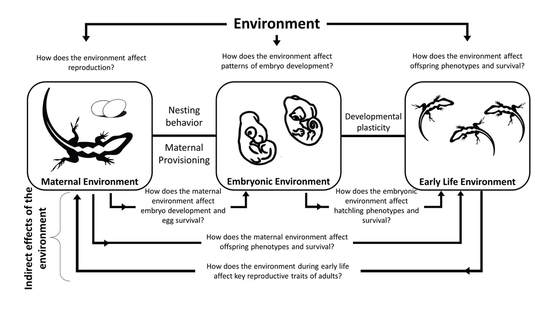"The scientists of today think deeply instead of clearly. One must be sane to think clearly, but one can think deeply and be quite insane."
- Nikola Tesla
- Nikola Tesla
Overview of research in the Devo Eco Lab
 An overview of our research framework and the core questions it generates. We focus on the embryonic environment; however, the maternal environment is linked to the embryo environment via maternal care (e.g. nesting behavior) and provisioning (e.g. yolk caloric content). Moreover, via developmental plasticity, the embryo environment is linked to the success of neonates and ultimately adults. Environmental conditions can directly influence each life stage; however, they can also affect one stage through its effects on another (i.e. indirect effects).
An overview of our research framework and the core questions it generates. We focus on the embryonic environment; however, the maternal environment is linked to the embryo environment via maternal care (e.g. nesting behavior) and provisioning (e.g. yolk caloric content). Moreover, via developmental plasticity, the embryo environment is linked to the success of neonates and ultimately adults. Environmental conditions can directly influence each life stage; however, they can also affect one stage through its effects on another (i.e. indirect effects).
We are fascinated by the roles of ‘nature vs nurture’ in development. For 400 years, philosophers have debated the relative importance of inborn and acquired traits (Locke’s ‘blank slate’ vs Descartes ‘innate ideas’). Genes are powerful agents that shape our bodies, govern our physiology, and direct our behavior; however, our genes interact with the environment at each stage of development. The goal of our research is to understand how the environment influences fitness-relevant phenotypes across multiple life stages. As developmental ecologists, we focus on the embryonic stage; however, we incorporate studies of reproduction (i.e. adults) and early life (i.e. neonates) to understand the causes and effects of patterns of embryo development. Humans are rapidly changing the environment on a global scale and embryos are particularly sensitive to environmental disturbance; thus, it is an important time for us to understand the impact of the environment on development.
Our research framework uses both field and lab methods and integrates physiology, morphology, behavior, performance, ecology, and evolution. Thus, it can accommodate a diversity of student interests, train students in an assortment of methods, and immerse them in a variety of theory. Moreover, it is of grander significance because it helps us understand an age-old question: how does the developmental environment shape our future?
Our research framework uses both field and lab methods and integrates physiology, morphology, behavior, performance, ecology, and evolution. Thus, it can accommodate a diversity of student interests, train students in an assortment of methods, and immerse them in a variety of theory. Moreover, it is of grander significance because it helps us understand an age-old question: how does the developmental environment shape our future?
Student Research Projects
2024
The long-term effects of thermal developmental plasticity on the endangered Streamside Salamander (Ambystoma barbouri)
- Cindy Scruggs, MS Student (pdf)
The impact of incubation temperature on hatchling and larval form of Tennessee Streamside Salamanders (Ambystoma barbouri)
- Garrett Oran, undergraduate student (pdf)
2023
Transcriptome assembly, annotation, and comparative analysis for characterizing adaptive potential of the Streamside Salamander (Ambystoma barbouri)
- Miranda Gaupp, PhD Student (pdf)
Effects of food availability on energy allocation in Sceloporus undulatus
- Haley Oakley, MS Student (pdf)
A novel application of membrane inlet mass spectrometry to study larval physiology of the Streamside Salamander (Ambystoma barbouri) - Kaitlyn Darnell, CISE undergraduate student (pdf)
The effects of incubation temperature on larval morphology of the locally endangered Streamside Salamander (Ambystoma barbouri)
- Tatyana Natal, undergraduate student (pdf)
Thermal adaptation of Streamside Salamanders (Ambystoma barbouri) across a latitudinal gradient
- Julia Thulander, MS Student (pdf)
Incubation moisture and temperature influence embryo physiology in the Eastern Fence Lizard (Sceloporus undulatus)
- Lydia Dudley, CISE Undergraduate Student (pdf)
2022
Incubation moisture influences embryo physiology in the Eastern Fence Lizard (Sceloporus undulatus)
- Lydia Dudley, CISE Undergraduate Student (pdf)
Changes in reproduction and growth in response to food availability In Sceloporus undulatus
- Haley Oakley, MS Student (pdf)
The long-term effects of thermal developmental plasticity on the endangered Streamside Salamander (Ambystoma barbouri)
- Cindy Scruggs, MS Student (pdf)
The impact of incubation temperature on hatchling and larval form of Tennessee Streamside Salamanders (Ambystoma barbouri)
- Garrett Oran, undergraduate student (pdf)
2023
Transcriptome assembly, annotation, and comparative analysis for characterizing adaptive potential of the Streamside Salamander (Ambystoma barbouri)
- Miranda Gaupp, PhD Student (pdf)
Effects of food availability on energy allocation in Sceloporus undulatus
- Haley Oakley, MS Student (pdf)
A novel application of membrane inlet mass spectrometry to study larval physiology of the Streamside Salamander (Ambystoma barbouri) - Kaitlyn Darnell, CISE undergraduate student (pdf)
The effects of incubation temperature on larval morphology of the locally endangered Streamside Salamander (Ambystoma barbouri)
- Tatyana Natal, undergraduate student (pdf)
Thermal adaptation of Streamside Salamanders (Ambystoma barbouri) across a latitudinal gradient
- Julia Thulander, MS Student (pdf)
Incubation moisture and temperature influence embryo physiology in the Eastern Fence Lizard (Sceloporus undulatus)
- Lydia Dudley, CISE Undergraduate Student (pdf)
2022
Incubation moisture influences embryo physiology in the Eastern Fence Lizard (Sceloporus undulatus)
- Lydia Dudley, CISE Undergraduate Student (pdf)
Changes in reproduction and growth in response to food availability In Sceloporus undulatus
- Haley Oakley, MS Student (pdf)